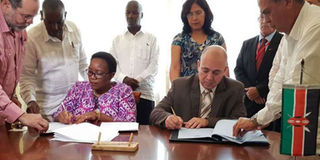Importing doctors will not help health sector, let us do a ‘Cuba’

Health CS Sicily Kariuki (seated left) and Cuban government official sign contract that will will see 100 Cuban doctors come to Kenya. PHOTO | FILE | NATION MEDIA GROUP
What you need to know:
- Health workers in Kenya will forever appreciate President Kenyatta’s good intentions to improve healthcare.
For a sustainable presence of specialists in the counties, the government should waive specialty training for local doctors for, say, 10 years.
There are close to 200 jobless specialist Kenyan doctors and even more medical officers whom the government has ignored despite the glaring shortage.
On importation of doctors from Cuba, Uganda’s Museveni had this to say: “I wanted to bring Cuban doctors because ours behaved very badly and unprofessionally. They started striking, incited other doctors and left our patients to die. They were blackmailing us.”
During the doctors’ strike in Kenya last year, President Uhuru Kenyatta seemed not to understand why a doctor in the public sector should earn more than their private sector colleague. He also wondered why the public doctors would demand better remuneration when they work for “two hours a day” — to loud ululation of the governors and other leaders at the forum he was addressing.
Going by the economic mantra, “you get what you pay for”, the President’s gesture said a lot about what our political leaders expect of public hospitals vis-a-vis the private ones — especially coming around the time when a governor had travelled abroad to have a possible scratch on the nose bandaged. This from a country whose doctors can re-attach limbs and separate Siamese twins.
HEALTH INSURANCE
Health workers in Kenya will forever appreciate President Kenyatta’s good intentions to improve healthcare. They support his ambition to increase health insurance coverage and investment in health technologies. They want what the President wants.
Like him, they want sustainable availability of specialised human resources and equipment for health.
However, the way these interventions are being done seems to have a lot to do with the doctors’ strike.
A key reason for the strike was poor retention of specialist doctors in the counties. The union argued that, to get specialised doctors to stay, the country needs to attract them to the counties by better remuneration and improved working conditions.
LOCAL SPECIALISTS
But politicians could not wrap their heads around this, as it would mean “young girls earning more than the county ministers”, as one political leader put it, “distorting the pay structure in the public sector” — meaning other professionals would demand higher pay that would equal or even surpass what politicians earn. (The monopoly of Land Cruisers on the roads would be threatened.)
So, it is impossible to attract local specialists through financial incentives but easy to pay Cubans billions of shillings in salaries and an array of benefits? That is more than what it would take to attract and retain local specialists
In Cuba, there is a doctor for every 155 people; in Kenya, it’s 1:16,000. Other than go for a handful of Spanish-speaking specialists who are ill-prepared for our well-equipped laboratories and theatres at double the cost of hiring local specialists, why not build our own human resources for health from the ground? That is what Cuba did.
SPECIALTY TRAINING
For a sustainable presence of specialists in the counties, the government should waive specialty training for local doctors for, say, 10 years. These doctors would be bonded to the counties long enough for replenishment even if they left. Over time, a critical mass would be built and the system developed to attract even more.
Other than provide perks to foreigners, the government can give car loans, mortgages and training incentive to citizens. That would build patriotism, save us foreign exchange and have the salary spent locally.
Instead of sending a few doctors for training in unapproved courses in the Caribbean, our medical schools should be expanded and private institutions given incentives to train them.
NON-SUSTAINABLE
Finally, there are close to 200 jobless specialist Kenyan doctors and even more medical officers, dentists, pharmacists, nurses and clinical officers whom the government has blatantly ignored despite the glaring shortage in their fields.
Unless there is much that is not revealed about the Cuban deal, it seems aesthetic, ego-driven and non-sustainable. It should be reconsidered.
Dr Mwenda is a medical practitioner in Tana River County. [email protected]





